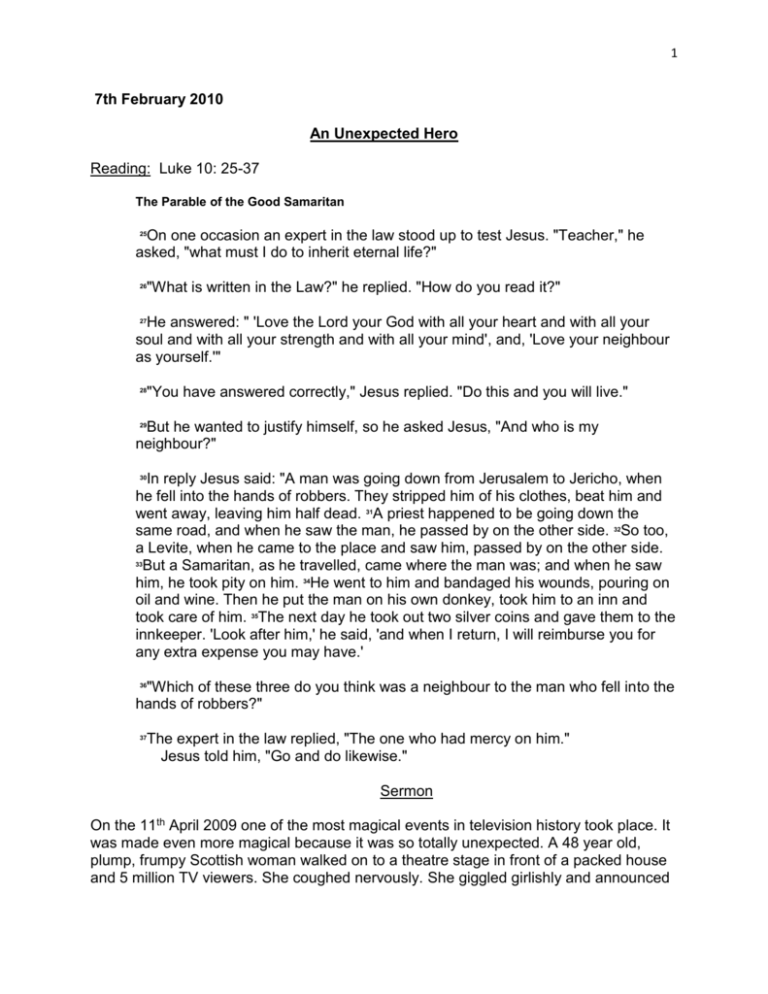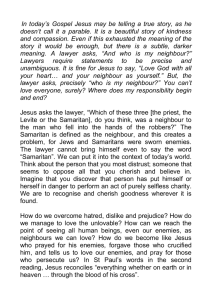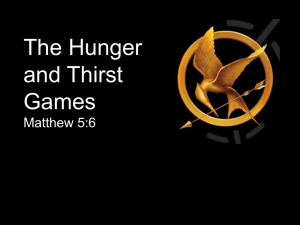An Unexpected Hero - Bures Parish Church
advertisement

1 7th February 2010 An Unexpected Hero Reading: Luke 10: 25-37 The Parable of the Good Samaritan On one occasion an expert in the law stood up to test Jesus. "Teacher," he asked, "what must I do to inherit eternal life?" 25 "What is written in the Law?" he replied. "How do you read it?" 26 He answered: " 'Love the Lord your God with all your heart and with all your soul and with all your strength and with all your mind', and, 'Love your neighbour as yourself.'" 27 "You have answered correctly," Jesus replied. "Do this and you will live." 28 But he wanted to justify himself, so he asked Jesus, "And who is my neighbour?" 29 In reply Jesus said: "A man was going down from Jerusalem to Jericho, when he fell into the hands of robbers. They stripped him of his clothes, beat him and went away, leaving him half dead. 31A priest happened to be going down the same road, and when he saw the man, he passed by on the other side. 32So too, a Levite, when he came to the place and saw him, passed by on the other side. 33 But a Samaritan, as he travelled, came where the man was; and when he saw him, he took pity on him. 34He went to him and bandaged his wounds, pouring on oil and wine. Then he put the man on his own donkey, took him to an inn and took care of him. 35The next day he took out two silver coins and gave them to the innkeeper. 'Look after him,' he said, 'and when I return, I will reimburse you for any extra expense you may have.' 30 "Which of these three do you think was a neighbour to the man who fell into the hands of robbers?" 36 The expert in the law replied, "The one who had mercy on him." Jesus told him, "Go and do likewise." 37 Sermon On the 11th April 2009 one of the most magical events in television history took place. It was made even more magical because it was so totally unexpected. A 48 year old, plump, frumpy Scottish woman walked on to a theatre stage in front of a packed house and 5 million TV viewers. She coughed nervously. She giggled girlishly and announced 2 to the judges in front of her that she was going to sing a song. The audience expected 3 minutes of toe curling embarrassment. Suddenly instead, the theatre was filled with a powerful, perfectly pitched singing voice which beautifully brought out the song’s deep, emotional meaning. Before she sang the judges were mockingly condescending. Now they were transfixed; such an extraordinary sound coming from such an unlikely source. The tearful audience rose to their feet, long before she had finished, to acclaim this astounding performance. Within 10 days the video of this event had gone round the world. Over a 100 million people had seen it. Susan Boyle was an overnight sensation. She has become an unexpected heroine. This morning we’re looking at an event and a story which has been heard by over 20 times as many people as have seen that astounding performance last April. Like that evening with Susan Boyle we see a person under pressure; in front of judges. A young man, this time, who many people were treating as a rabbi, found himself about to be tested by a clever lawyer. The lawyer stood up. “Teacher, what must I do to inherit eternal life?” Jesus threw the question back at him, “What does the Law say? How do you interpret it?” The lawyer gave a very good answer. “You shall love the Lord your God with all your heart, soul, strength and mind. And love your neighbour as yourself. “That’s great” responded Jesus. “Do that and you shall live.” But there is one subtle difference in the words here that doesn’t come out in the English translation. When the lawyer asked “What shall I do?” he was inquiring what single action he could perform to have eternal life – like giving a huge gift of money to the poor or working in a leper colony for a day. But when Jesus answered “Do that and you shall live” the word “do” was in the continuous tense – do, and keep on doing. Jesus was saying you can’t have eternal life by performing a single one-off act. The way to eternal life is to love God with everything you’ve got; and keep on doing it. Love your neighbour as yourself; and keep on doing it. A far more difficult proposition than simply one grand gesture. It seemed as if the lawyer was little upset by the ease with which Jesus had answered his question and the slight “put down” over the word “do”. So Luke says here that the lawyer wanted to justify himself. Now it’s always, always a dangerous thing to try and justify yourself in front of Jesus. But the lawyer carried on and followed up by asking “And who is my neighbour?” This question brought out one of the most famous stories ever told. It had a devastating effect on its hearers. It must have been preached on thousands of times. So what is its meaning? An obvious message to bring out is that we must do our best for those in need. That’s certainly true but is there more to it than that? Another interpretation is the extreme allegorical one which links every part of the story to an aspect of church life. This form of interpretation was popular in the Middle Ages. Here it runs like this: The wounded man is Adam. Jerusalem is the state of innocence from which Adam fell. The thieves who beat him up are the devil; the priest and the Levite are Old Testament religion which couldn’t help him; the Good Samaritan is 3 Christ; the inn is the church; the two coins are the sacraments of baptism and the Lord’s Supper and, of course, the innkeeper is the Pope! And there is some truth in this heavily stylised version. The road from Jerusalem to Jericho is extremely hazardous. The distance between the 2 towns is just under 20 miles with a steep descent of 3,600 feet between them. It was a road of narrow, rocky passages and of sudden turnings, perfect for thieves and bandits. It was so dangerous it was known as “The Bloody Way”. As late as 1930 travellers were told not to use the road at night because of the chance of a hold-up. If you walked down the road on your own you were asking for trouble. We know the parable well in the 1st century version but we ought to put it into a 21st century context. So here we go: A City business man has been working late at the office and has caught the last train out of Liverpool St to Colchester. At Chelmsford the doors close and he’s alone in the carriage. From the next carriage come 3 noisy, drunken thugs. They think they’ll have some ‘fun’. So they pick up the man’s briefcase and throw it across the seats, scattering papers all over the floor. As he gets up one of the bullies punches him hard in the face; another kicks his leg. He slumps in the corner and the thugs eventually get out at Witham. As he lies there semi-conscious, feeling his blood running down his chin, an Archdeacon from the cathedral enters the train. He takes one look at the man and thinks to himself “Disgraceful, what has the world come to? Obviously a late night reveller who, in his drunken state, has fallen down and cracked his head”. And he walks through to the next carriage. Feeling the call of nature, a Lay Reader in the Church of England wanders through the carriage and, to his horror, catches sight of the man slumped across the seat. The Lay Reader thinks “I must get to the loo. And anyway I hate the sight of blood. I’ll be getting off at Marks Tey. I’m sure there’s someone better able than me to deal with this.” And he walks on. The train stops at Kelvedon. A swarthy man with a heavy beard gets on. He’s a Muslim. When he sees the man he goes right over to him. “You poor man,” he says, “here, let me lift you up.” He lifts him from his seat, gathers up his papers, takes out a clean handkerchief and wipes away his blood. The train stops at Marks Tey where the Muslim was due to get out. He decides he can’t leave the man like this. He stays on the train and gets off at Colchester. Putting the man’s arm around his shoulder he leads him out of the station, into a taxi and off to A and E. He waits with him as his wounds are seen to and then takes another taxi to a hotel in town. There he tells the receptionist that he’ll help the man to his room and gives her a cheque for board and lodging. The Muslim is an unexpected hero. When Jesus finished his story he simply asked the lawyer “Who was the neighbour to the man who was beaten up?” Now the Jews hated the Samaritans with a passion. They would go out of their way to avoid them, and certainly would never speak to them. 4 A GOOD Samaritan? – surely a contradiction in terms! When Jesus asked who the neighbour was in the story the lawyer couldn’t even bring himself to say “the Samaritan”. All he could reply was “The man who had pity on him”. And to the speechless and humiliated lawyer Jesus added “Go and do, and keep on doing, likewise.” The Samaritan certainly was an unexpected hero. One of the brilliant aspects of this story is that it covers so many emotive issues. One of them is racism. The Old Testament says “Love your neighbour as yourself”. The rabbis had interpreted that as saying “Love your Jewish neighbour as yourself”; immediately twisting and limiting God’s words. By telling us this story Jesus throws that interpretation right out of the window. Racism has always been a major problem in our world. Here’s a true account. “A white Johannesburg gold miner was working deep underground when suddenly the roof caved in and he was trapped. It was soon decided that the mine was too dangerous to attempt a rescue. It was roped off. Nobody was allowed near. As people stood by, suddenly a black African broke through the protective cordon and rushed to the entrance. Down the mine shaft he went, scrabbled through the rocks and brought the man out alive. He was an unexpected hero. Two days later the rescuer was asked to visit the miner in hospital. The African entered the ward. When the miner saw the colour of the man’s skin he turned over in his bed. He wouldn’t even acknowledge him – not even the man who saved his life. If we asked everyone here, “Why do you go to church?” I wonder what answers we would get. “I like to repeat the familiar words”? That’s a reasonable answer. “I like to meet my Christian friends”? That’s understandable. “I come to worship God”? That’s a good answer. The priest and the Levite or the Archdeacon and the Lay Reader could have replied with all these answers; and with great sincerity. But they were all heavily criticized in this parable. So what was wrong? What was missing? The trouble is that if our churchgoing doesn’t fill us with concern, compassion and pity for others in need; and if that doesn’t turn to action, then our religion is dead. I’m sure the Priest and the Levite knew their Old Testament backwards. I’m sure the Archdeacon was a wonderful administrator. I’m sure the Lay Reader preached brilliant sermons. But without being filled with concern for the needy; and with compassion only for their own race, colour or creed then they were wasting their time. The first command to love God with heart, soul, strength and mind leads naturally on to caring for our neighbours, whoever they may be. The result of our worship should be that our hearts are softened by the Holy Spirit and we go out into the world filled with love and compassion for those around us. So far we have looked at 3 unexpected heroes – Susan Boyle in her one woman television sensation; the Samaritan/Muslim in his rescue act and the black African in his extreme courage. Here’s one more. 5 A father and son were sitting one day in their palace. They lived in a community full of peace and perfect harmony. (We saw a good picture of it in our first reading). The father said to the son “I’ve created a wonderful world down there and made men and women to populate it. But they’ve made a real hash of things. I’ve given them sound advice as to how to live but they have either ignored it or twisted it to suit their own evil desires. My son, I would like you to leave this wonderful place and go down to live among them. You are to live in a tough area, an occupied land. You are to live a perfect life among this wayward people. You will heal the sick and teach everyone firsthand the best way to live. They should really appreciate you and first of all they will idolise you. Then they will criticise you and finally they will crucify you. Toughest of all, you are personally to pay the penalty for all the many indescribable things they have done. Are you prepared to do this?” Thankfully the answer was “Yes”. If you are a Christian you will have known, maybe not literally, but you will have known what it was like to be beaten up by the World and left lying in the gutter. You will have known the hand that gently lifted you up, mended your wounds and put you back on your feet. You will have known what it is to have your debts paid for you. You will have known what it is like to be given strength to face the future. You will have known what it is like to receive the “good Samaritan” treatment. You will have known the touch of the Son of God. He is the ultimate unexpected hero. How extraordinary that someone as great as he should reach down and rescue any one of us. But he did. And that unexpected hero says to everyone here, ”Now you go and do, and keep on doing, likewise”. ME








